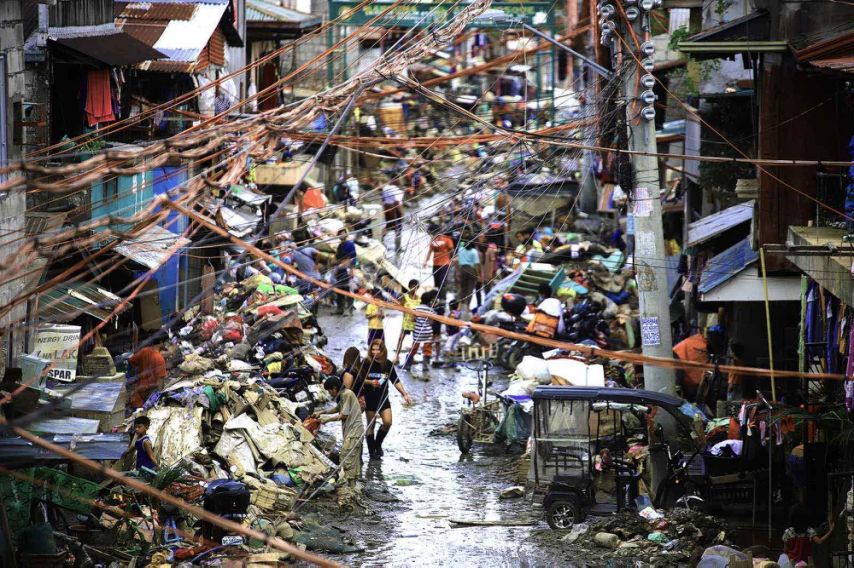
November 24, 2020 Tuesday

MANILA, 25 November 2020 — House Deputy Speaker Loren Legarda recommended stronger policy measures to help avert future loss and damage and ensure sustainable and resilient recovery, in light of the escalating climate-related disaster risks, compounded by factors caused by the COVID-19 pandemic.
In a privilege speech before the House plenary, Legarda said that the recent back-to-back typhoons that hit provinces in the Luzon and Visayas regions affected more than 6.7 million Filipinos and damaged over 35 billion pesos worth of infrastructure and agriculture.
She also noted that the amount of rainfall brought by the typhoons and the volume of water released by dams and the environmental degradation of the Sierra Madre range as a natural buffer against tropical cyclones have worsened the level of flooding in the affected areas.
Legarda recently filed House Resolution No. 1363 directing the House Sub-Committee on the New Normal to conduct an inquiry on the massive flooding caused by Typhoon Ulysses, in relation to the enforcement of environmental, climate change adaptation and mitigation, and disaster risk reduction and management laws by government agencies and local government units (LGUs).
The resolution also seeks to identify gaps in mainstreaming disaster risk reduction and climate change adaptation in development, investment, and land use planning.
Legarda noted that the track of Typhoon Ulysses was almost the same as Ondoy. In terms of rainfall amount, 347 millimeters of Ondoy rains fell within six hours as compared to the 356 millimeters of rains from Ulysses for the whole day on November 12.
She added that other factors led to Ondoy-level flooding during Ulysses, such as land use, construction of settlements and cultivation in flood-prone areas; excessive rainfall due to climate change; and siltation of waterways due to excessive soil erosion because of illegal logging and deforestation.
She also mentioned that poor or non-implementation of the Ecological Solid Waste Management Law also contributed as seen in the huge amounts of plastic debris floating on water. The law, which she principally authored and sponsored in the Senate, mandates the proper segregation of waste at source and the establishment of materials recovery facility within LGUs.
Among the recommendations she noted in the resolution were to:
Regularly declog canals, roadside ditches, and drains, as well as supplement traditional flood mitigation projects, such as river dredging, dike construction, and tree planting upstream, with natural flood intervention programs, such as river and floodplain restoration;
Pursue landscape and ecosystem-based comprehensive development and land use planning informed by geohazard maps and risk assessments;
Ensure that geohazard maps are updated to take into account current and projected climate hazards and are well-understood by LGUs, and provide a basis to consider measures based on their assessment of these risks; and
Determine areas for improvement in the capability and agility of PAGASA’s systems for climate observation and projection, weather forecasting, and real-time climate information dissemination to dam operators, national government agencies, LGUs, academe, and research institutions; as well as for translating scientific climate information into more relatable messages of potential impacts for more effective risk communication down to the last mile.
“While PAGASA provided timely and accurate scientific information about typhoon Ulysses, this did not translate to how people imagined the typhoon would be. Scientific information must be understandable, actionable, and relatable,” Legarda stated.
As a Climate Vulnerable Forum (CVF) Ambassador for Parliaments and UNISDR Global Champion for Resilience, Legarda voiced out the need to accelerate and scale up support for vulnerable developing countries like the Philippines in the areas of finance, green technology, and capacity development to build resilience against extreme weather events that are attributed to continued rising emissions of greenhouse gases mostly from industrialized nations.
“To make adaptation truly work for us requires efforts not just among us but from the international community, and both the public and the private sectors, to bring about the needed investments to enable genuine resilience,” Legarda stressed.
In closing, Legarda said that resilience should be all about empowering the people not merely with inspiration but with the right tools and the means to be able to decide and take action, for them not to be defenseless.
“We have described Filipinos as resilient or tenacious in the face of these many disasters that come our way, as if resilience is purely based on spirit and determination. As if wading through neck-deep floodwater, waiting for hours on top of your house to be rescued, or just generally enduring one typhoon after another, is resilience in itself,” Legarda said.
“As leaders of our nation, we are accountable to the people we serve. More lives are at stake, especially in this era of the climate crisis made more challenging by COVID-19. Our decisions and actions will have an impact on our communities and our nation,” Legarda concluded.